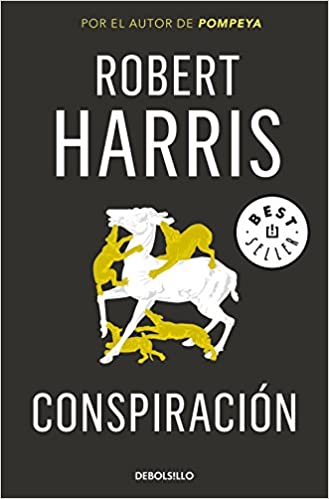A well-understood historical novel must have, in my opinion, an explicit primary intention of entertainment. Using fiction as an indoctrinating weapon, for national exaltation or as a new alternative truth ends up giving a partisan whiff that I detest in this type of narrative. If you want to write about History from a subjective point of view, write an essay. It is about respecting both History and Literature, without dark combinations for God knows what purpose.
Don't worry, it's not the case Robert Harris, an author as committed to history as to fiction. A bestselling author, a good connoisseur of the proposed historical setting and plotter parallel to that Story. Writing a historical novel with raised letters is an exercise in honesty that every writer of this genre should put first, as a kind of Hippocratic oath of letters.
After all, Harris is a self-taught historian, as his training is more closely related to English Literature. Perhaps that is why he starts from respect for the proven facts before launching into a wonderful fiction about past situations or about shamelessly fictional lucubrations.
A renowned journalist and columnist in his country, England, Robert ended up turning to professional narrative, materializing his old claim to be a writer. Given his sales, the objective was absolutely achieved.
3 recommended novels by Robert Harris:
Homeland. 1964, is the end of the Third Reich nearing?
On World War II, the Third Reich and Nazism have run rivers of ink. I made my first steps with a supposed Hitler exiled to Argentina.
The thing about the ucronías, the thing about fantasizing about what could have happened if History did not pass along the marked channel is an exciting narrative field that not a few authors have approached in one way or another. The Harris thing in this book is a pure, resounding uchrony. Hitler was never defeated, Nazism continued to spread its policy of National Socialism and its final solution ...
Summary: In 1964, a victorious Third Reich prepares to celebrate the 75th anniversary of Adolf Hitler.
At that moment, the naked corpse of an old man appears floating in a lake in Berlin. This is a senior Party official, the next in a secret list that condemns everyone on it to death.
And they have been falling one after another, in a conspiracy that has only just begun ... Patria 1964 recounts a dark future, imagined by Robert Harris, the author of the fast-paced thrillers Enigma and Stalin's son. This novel has been taken to both film and television.
Conspiracy
Daring with ancient Rome as a narrative argument supposes a desire to know and approach all kinds of very distant particularities in time and in forms.
Harris recreates in this book the whole world of conspiracies in which the Roman Empire moved during its centuries of world domination. Without a doubt the best of his novels in the Cicero trilogy.
Summary: Consul Cicero, a convinced republican, has powerful enemies ready to finish him off. One of them is called Caesar ...
Excellent fictionalized recreation of one of the most exciting episodes in the history of Rome, starring a Cicero who has to face the perfidy and cunning of enemies of the stature of Catilina or Caesar himself.
The author reconstructs with great rigor the entire network of intrigues and corruptions that reigned in Rome in 63 BC, and how the consul Cicero thwarts the conspiracy of Catilina and becomes the savior of the Republic.
However, Caesar, who manages to escape the conspiracy unscathed, allies with Crassus and the successful General Pompey to neutralize the Senate. The Republic's days are numbered, and Cicero, forced into exile, has only one day to abandon everything and save his life.
The power in the shadow
Not everything is a Historical novel in Harris's case. The political thriller is also a field in which the author works with sufficiency.
Halfway between spy novels, only taking well-recognizable aspects of reality to fictionalize the underworld of international politics and the great dangers of terrorism and organized crime.
Summary: A fast-paced political intrigue inspired by real characters. The "Negro" in charge of writing the autobiography of the former British Prime Minister has died under strange circumstances. His replacement finds disturbing information that may prove the president's connection with war crimes covered up by the fight against terrorism.
When the politician dies in an attack, the writer will understand that now more than ever his life is hanging by a thread.
A gripping political thriller, with recognizable characters from international politics. An open critique of world politics and the established order.
Other recommended novels by Robert Harris:
Munich
Perhaps the Munich accords of September 30, 1938 were the launching off of the imperialist anxieties of Nazism. The annexation of the Sudetenland to Nazi Germany was that concession to the cause of the Third Reich, prior to the final outbreak of World War II, and interpreted by Hitler as a gesture of weakness by the European leaders of France and the United Kingdom who attended that disastrous meeting.
Nobody better than Robert Harris to novel a fascinating intrahistory in this unique context. A narrative respectful of the facts but masterfully led towards that desired uchrony about to come true.
At times, with the intervention of some magisterial characters such as Hugh Legat, right-hand man of the British President Chamberlain and in charge of an underground task during the president's trip to Munich; and of the German Paul Hartmann, an outspoken opponent of Hitler and a diplomat with the last links of power that can reverse the situation, the novel acquires an aftertaste of Ken Follet in The winter of the world.
Only Harris is more oriented to the historical thriller, to the most electric suspense without concessions, to the unique setting in which the reader delves into detail with an exquisite taste for detail, through the interstices that real history offers to infiltrate fictional cases that disturb and surprise .
Those days of September 1938, with the echoes of the Sino-Japanese war becoming increasingly close drums of conflict for Europe, Hitler seemed to anticipate with his annexationist provocations what would finally happen a year later when he invaded Poland.
Chamberlain believes he has time to stop Hitler. The same happens with his secretary Hugh Legat, who kills his friend Paul Hartmann and draws up a secret plan with which they sense that they can transform a reality that points to imminent tragedy.
And that is where Robert Harris's masterful gifts for suspense emerge with intensity, leading the reader through a scenario that seems to advance parallel to the events of those days, capable of interacting and transforming what happened, awakening intense emotions and sensations throughout. through its accurate descriptions of the extreme situations that the characters go through.




